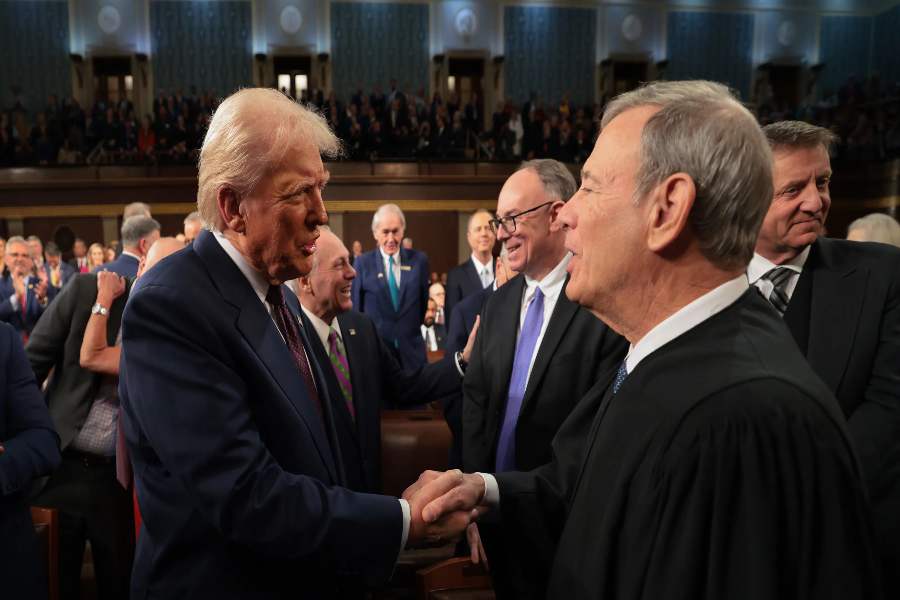WASHINGTON – The mounting clash between President Donald Trump and the judiciary reached a new level after Chief Justice John Roberts issued a rare public rebuke of the president’s call to impeach a federal judge. Trump’s demand, targeting Chief U.S. District Judge James Boasberg, followed the judge’s ruling against a key deportation policy. The move has set the stage for an unprecedented standoff between the executive and judicial branches of government.
Roberts’ statement, a striking and direct response to Trump’s remarks, defended the independence of the judiciary. “For more than two centuries, it has been established that impeachment is not an appropriate response to disagreement concerning a judicial decision. The normal appellate review process exists for that purpose,” Roberts said. His words underscored the fundamental principle of judicial independence, warning against political retaliation against judges for their rulings.
Trump’s impeachment demand is the latest escalation in his administration’s ongoing confrontation with the courts. Federal judges have repeatedly ruled against his policies, including mass deportations, the firing of federal workers, and bans on transgender military service. The administration has aggressively pushed back, portraying the judiciary as an obstacle to its agenda rather than an independent arbiter of the law.
In recent weeks, judges have halted several of Trump’s executive actions, including deportation flights under the Alien Enemies Act. Among those challenging their deportation is Mahmoud Khalil, a Columbia University student targeted for his participation in protests against Israel’s military actions in Gaza. A Manhattan federal judge, Jesse Furman, rejected the administration’s attempt to dismiss Khalil’s legal challenge, further frustrating the White House.
Trump’s response to judicial opposition has been unprecedented. His allies have not only criticized unfavorable rulings but have also attacked judges personally, questioning their legitimacy. White House press secretary Karoline Leavitt suggested that judges who oppose Trump’s policies are overstepping their authority. “If a federal district court judge would like executive powers, they can try and run for president themselves,” she said.
Trump, undeterred by Roberts’ warning, doubled down on his stance during a Fox News interview with Laura Ingraham. “We have very bad judges, and these are judges that shouldn’t be allowed,” Trump said. “At a certain point, you have to start looking at what you do when you have a rogue judge.” His comments signal an ongoing effort to pressure the judiciary into compliance with his administration’s agenda.
Trump’s allies, including Elon Musk and former House Speaker Newt Gingrich, echoed his attacks on the judiciary. Musk, who has supported Trump’s initiative to downsize the federal government, wrote on X, “For more than two centuries, there has never been such extreme abuse of the legal system by activists pretending to be judges. Impeach them.” Gingrich suggested that the Supreme Court should take proactive steps to curb judicial opposition to Trump’s policies.
The administration’s increasingly aggressive stance raises concerns about potential defiance of court orders. Trump’s border czar, Tom Homan, suggested that the administration might disregard judicial rulings blocking deportations. “We’re not stopping,” Homan declared on Fox & Friends. “I don’t care what the judges think. I don’t care what the left thinks. We’re coming.”
Attorney General Pam Bondi also hinted at continued deportation efforts despite legal challenges. Asked by Fox News’ Jeanine Pirro whether the administration would continue flights under the Alien Enemies Act, Bondi responded affirmatively, stating, “Absolutely. These are foreign terrorists—the president has identified them and designated them as such—and we will continue to follow the Alien Enemies Act.”
The judiciary’s resistance to Trump’s agenda has been a defining feature of his presidency, and Roberts’ statement marks a pivotal moment in this ongoing battle. Roberts, who has at times been criticized for shielding Trump through Supreme Court rulings, has also taken steps to defend judicial independence. His court has ruled against several of Trump’s actions, reaffirming legal constraints on executive power.
Tuesday’s statement from Roberts was not his first foray into the public defense of judicial independence. In 2020, he criticized Senate Majority Leader Chuck Schumer for remarks suggesting Supreme Court justices would “pay the price” for their decisions in an abortion case. Now, Roberts’ defense of the judiciary against Trump’s attacks has drawn both praise and criticism.
Harvard Law professor Adrian Vermeule argued that Roberts overstepped his role by commenting publicly on impeachment, a power reserved for Congress. Meanwhile, former Supreme Court Justice Stephen Breyer defended Roberts, stating, “He’s trying to explain to the people of this country how the legal system works and how it doesn’t work. It doesn’t work by impeaching a judge because you don’t like his decision.”
The confrontation between Trump and the judiciary is unlikely to subside. The president’s continued attacks on judges, combined with his administration’s defiance of court rulings, signal a deepening institutional crisis. If Trump’s allies move forward with impeachment efforts against judges who rule against him, it could further erode trust in the separation of powers and the rule of law.
For now, Chief Justice Roberts’ rebuke stands as a reminder that the judiciary remains an independent check on executive power. Whether Trump and his administration will respect that independence in the long run remains an open—and troubling—question.
